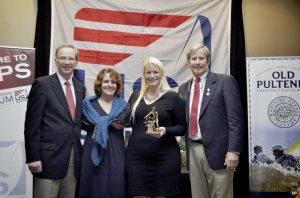Kudos are in order—yet again—for Oakcliff Sailing Center in Oyster Bay. Liz Shaw, Trainer Program Director at Oakcliff, accepted the U.S. Sailing’s Joe Prosser Award at the National Sailing Programs Symposium (NSPS) in Milwaukee, WI. This esteemed award is given to an organization that has made an exemplary contribution toward improving the quality and safety in the training or instruction of sailors. This is the top award a training facility can receive from U.S. sailing and embodies everything that Oakcliff stands for.

(From left): Tom Hubbell, US Sailing President; Charlie Arms, US Sailing
Training Committee Vice Chair; Oakcliff’s Elizabeth Shaw and Richard Jepsen,
award presenter and Chairman of the US Sailing Training Committee.
Charlie Arms was also the woman that nominated Oakcliff for this award.
In accepting the award for Oakcliff, Shaw said it was an “honor to be recognized by so many inspirational peers in the sailing community. The knowledge that we are filling a void in American sailing is an integral part of what keeps U.S. moving ahead with our goals and ambitions at Oakcliff.” For more information about Oakcliff Sailing, go to: www.oakcliffsailing.org. For info on U.S. Sailing, go to www.ussailing.org.
For those who may be unfamiliar with Oakcliff Sailing Center, their tag line is “To Good to be True.” Those who have had anything to do with Oakcliff agree this is the perfect (and true) tag line for the center. In 2014, the program for Saplings and Acorns (open to sailors over 15 years of age), Staff and supporters hosted six National Championships in Olympic classes and a Match Race, completed more than double the match racing of any other venue in the U.S., completed the Newport to Bermuda Race, the RORC Transatlantic, Oakcliff International Match Race Event, and on-site training with U.S. Sailing Sperry Topsider team members. Their 360-degree training ensures that graduates are proficient with marine electronics, rigging, composite repair, sailmaking, marine engines and campaign management, and their graduates have a 87 percent industry job placement.
Some exciting news coming out of Newport has been made available, which may be of interest to parents of college-aged children. Beginning in fall 2015, Salve Regina University students can enroll in courses leading to the new 48-credit bachelor of science degree in Cultural and Historic Preservation-Traditional Building Arts (CHP-TBA) in what administrators believe is the only
collaborative program of its kind in the country. “This educational partnership blends theory and practice, and the past and the present in a unique way,” said Jane Gerety, RSM, Salve Regina president. “The integration will prepare students for meaningful and important work.”
The new bachelor’s degree track is a logical extension of the goals of the CHP program at Salve, which include the preparation of students to participate in and contribute to the practice of historic preservation in the United States, explains Robert Russell, director of the Noreen Stonor Drexel Cultural and Historic Preservation program at Salve. “Further, one of the core goals of Salve is the ‘linking of the past, present and the future,’” he said. “This new track endeavors to do precisely that, resuscitating lost and nearly lost practices and materials connected with the traditional building arts and teaching them to a current generation of students so that they can become the future restorers of the country’s historic buildings.”
In addition to completing an undergraduate degree at Salve, students will also enroll in courses taught at the International Yacht Restoration School (IYRS), located on Thames Street in downtown Newport. “This will be a full-on IYRS experience, deeply experiential, very hands-on, incorporating technology,” IYRS President Terry Nathan said of the student experience. “The Salve students will be side-by-side with students coming directly through the IYRS program, and we think that’s really important. We’ve had some wonderful experiences doing collaborative seminars. It’s incredibly interesting to see students from different backgrounds and skill-sets come together to work on the same things.”
Russell said this unique partnership directly addresses a significant problem facing historic preservation in the country: the lack of craftsmen and women adequately trained in the traditional building arts. Educational institutions, he said, must play a role in reviving these skills. “There are the traditional academic skills of inquiry and analysis, but in the case of the new CHP/TBA track, these are also the physical and tactile skills involved with the creation of useful and beautiful objects. “The 20th century saw the almost complete disappearance of people capable of executing traditional designs in traditional and historically accurate materials,” he said. “The building trades developed along other lines and those who in the past were responsible for maintaining standards—owners of private companies, or unions—have largely forgotten that this was historically one of their most important jobs.”
News about new developments in Paralympic sailing has left many scratching their head and wondering, “what were they thinking.” The International Paralympic Committee (IPC) has announced that the Tokyo 2020 Paralympic Games will feature 22 sports, with badminton and taekwondo included for the first time, but no sailing. At its meeting in Abu Dhabi, UAE on Jan. 31, the IPC Governing Board approved a further six sports for inclusion in the Games, adding to the 16 sports that were ratified and announced after its meeting in October 2014. A maximum of 23 sports could have been included for 2020.
Tom Hubbell, president of U.S. Sailing, had this to say about the IPC dropping Paralympic sailing, “The news about Paralympic sailing being dropped from the slate of sports at the Tokyo 2020 Paralympic Games is highly disappointing. Our sport attracts a diverse group of disabled athletes across the world, as demonstrated by the three fleets of sailors from 14 countries competing in Miami last week at ISAF Sailing World Cup Miami. U.S. Sailing will join the International Sailing Federation (ISAF), www.sailing.org,
the International Association for Disabled Sailors (IFDS), www.saiilng.org/disabled, and the national governing bodies of our fellow Paralympic sailing nations to lead an appeal of this decision in the fight for reinstatement of Paralympic sailing at the Tokyo 2020 Games.”
The two sports not included in Tokyo 2020 are football 7-a-side
and sailing.
Sir Philip Craven, IPC President, said: “To reach this decision, the IPC undertook the most extensive and rigorous review process ever of all the sports which started in November 2013.” He continued, “We decided not to include two sports: football 7-a-side and sailing—from the Tokyo 2020 program for the same reason. Both did not fulfill the IPC Handbook’s minimum criteria for worldwide reach.”






























